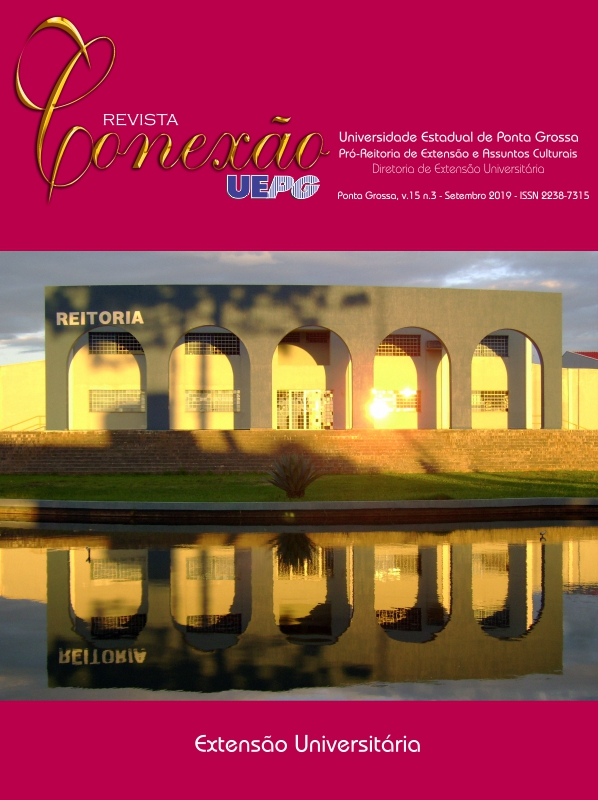DO PROCESSO DE INCLUSÃO AO DIREITO À COMUNICAÇÃO: A EXPERIÊNCIA DO CORAL DE LIBRAS "INCLUIR"
DOI :
https://doi.org/10.5212/Rev.Conexao.v.15.i3.0004Mots-clés :
Ensino Fundamental, Inclusão, LIBRAS.Résumé
Este artigo resulta do projeto de extensão “Coral de LIBRAS Incluir”, realizado pela Coordenação de Educação Inclusiva da Escola de Aplicação - Universidade Federal do Pará. As ações visaram promover a articulação entre o tripé ensino, pesquisa e extensão, por compreender que as Escolas de Aplicação constituem espaços de excelência e os conhecimentos desenvolvidos devem ser disponibilizados, visando contribuir com a transformação da realidade social. Os objetivos foram: possibilitar o acesso à Língua de Sinais dos alunos do 6º ano do Ensino Fundamental; propiciar um ambiente que priorize o respeito à diversidade, ajudando a formar cidadãos mais respeitosos e com espírito de coletividade. Desenvolvemos a pesquisa na abordagem qualitativa. Como resultados, identificamos que os processos inclusivos ainda encontram barreiras para se efetivar de forma plena na sociedade. No entanto, acreditar que a inclusão sugere uma escola em movimento motivou a escola a se adequar a esta nova organização da estrutura escolar.
Téléchargements
Références
BRASIL. Manual de Acessibilidade Espacial para Escolas. Brasília: MEC, 2009.
BRASIL. Diretrizes Operacionais da Educação Especial para o Atendimento Educacional Especializado: AEE na Educação Básica. Brasília: MEC, 2010.
BRASIL. Documento Orientador Programa Implantação de Salas de Recursos Multifuncionais. Brasília: MEC, 2012.
BRASIL. Lei de Diretrizes e Bases da Educação Nacional. Lei nº. 9394/96 de 20 de dezembro de 1996. Estabelece as diretrizes e bases da educação nacional. Diário Oficial da União. Brasília, 23 de dez. 1996.
BRASIL. Resolução 04 de 02 de outubro de 2009. Institui Diretrizes Operacionais para o Atendimento Educacional Especializado na Educação Básica, modalidade Educação Especial., DF. Disponível em: <http://www.planalto.gov.br/ccivil_03/leis/l8213cons.htm>. Acesso em: 17 mai. 2011.
BRASIL. Lei n. 10.436, de 24 de abril de 2002. Dispõe sobre a Língua Brasileira de Sinais-LIBRAS e dá outras providências. Diário Oficial da República Federativa do Brasil, Brasília, DF. 2002.
COLL, C et al. Desenvolvimento psicológico e educação. Trad. Fátima Murad. 2. ed. Porto Alegre: Artmed, 2004.
CRESWELL, J. W. Projeto de Pesquisa: método qualitativo, quantitativo e misto. 2. ed. Porto Alegre: Artmed, 2007.
CRUZ, Samara R.; ARAUJO, Doracina A. C. A história da educação de alunos com surdez: ampliação de possibilidades? Revista Educação Especial, Santa Maria, v. 29, n. 55, p. 373-384, maio/ago. 2016. Disponível em: http://dx.doi.org/10.5902/1984686X18832. Acesso em: 01 fev. 2019.
GLAT, R. Somos iguais a vocês: depoimentos de mulheres com deficiência mental. 2. ed. Rio de Janeiro: Agir, 2009.
GLAT, R. Educação Inclusiva: cultura e cotidiano escolar. Rio de Janeiro: 7 letras, 2009.
QUADROS, R, M. de; PATERNO, U. Políticas Linguísticas: O Impacto do Decreto 5.626 para os Surdos Brasileiros. Espaço: informativo técnico-científico do INES, Rio de Janeiro. n. 25, jan./jun. 2006.
SOUSA, D. V. C. Aquisição da língua de sinais por alunos surdos: ponto de contribuição e relevância na atuação do intérprete de língua de sinais. Revista Virtual de Cultura surda e diversidade. 2011.
Téléchargements
Publié-e
Numéro
Rubrique
Licence
a) Os autores mantêm os direitos autorais e concedem à revista o direito de primeira publicação, com o trabalho simultaneamente licenciado sob a Creative Commons Attribution License que permite o compartilhamento do trabalho com reconhecimento da sua autoria e publicação inicial nesta revista.
b) Ao submeter um artigo à Revista Conexão UEPG e tê-lo aprovado os autores concordam em ceder, sem remuneração, os seguintes direitos à Revista: os direitos de primeira publicação e a permissão para que a Revista redistribua esse artigo e seus metadados aos serviços de indexação e referência que seus editores julguem apropriados.
c) Os leitores são livres para transferir, imprimir e utilizar os artigos publicados na Revista, desde que haja sempre menção explícita ao(s) autor (es) e à Revista Conexão UEPG e que não haja qualquer alteração no trabalho original. Qualquer outro uso dos textos precisa ser aprovado pelo(s) autor (es) e pela Revista.

Este obra está licenciado com uma Licença Creative Commons Atribuição 4.0 Internacional.





